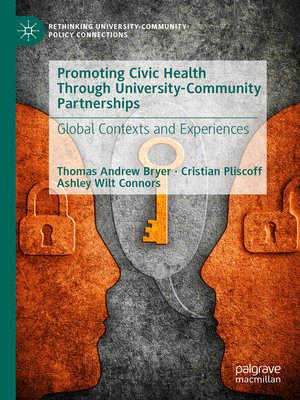Promoting Civic Health Through University-Community Partnerships
ebook ∣ Global Contexts and Experiences · Rethinking University-Community Policy Connections
By Thomas Andrew Bryer

Sign up to save your library
With an OverDrive account, you can save your favorite libraries for at-a-glance information about availability. Find out more about OverDrive accounts.
Find this title in Libby, the library reading app by OverDrive.



Search for a digital library with this title
Title found at these libraries:
| Library Name | Distance |
|---|---|
| Loading... |
"In their comparative analysis of several universities from different parts of the world, the authors make a case for the critical roles that higher education institutions can play in building the civic framework in a society."—Kyle Farmbry, Professor, School of Public Affairs and Administration, Rutgers University-Newark, United States
"By defining community, discussing how universities are often contested spaces, and covering how universities and students engage their communities, the authors make the case for the future university as one that facilitates civic health."—William Hatcher, Associate Professor, Augusta University, United States; Co-Editor-in-Chief, Journal of Public Affairs Education
"With a rich variety of historic notions, views, projects, examples and policies, the book inspires to re-think current positioning of students, staff and academic institutions in society."—Goos Minderman, Professor (Extraordinary), University of Stellenbosch Business School, South Africa
This book adds to a robust dialogue about the role of higher education in society by examining the promotion of civic health through university-community partnerships and the role of intellectual leaders, scientists, philosophers, university administrators and students in shaping whole or parts of the world. Our global society faces significant social and environmental challenges. Professors and whole universities have an obligation to help address these issues; how they do so is subject to social, cultural, and institutional context. With lessons from Americans, British, Estonians, Lithuanians, Russians, South Africans and beyond, the authors describe the state of the practice and provide frameworks through which universities and people working within or in partnership with can affect change in communities and civic lives.
"By defining community, discussing how universities are often contested spaces, and covering how universities and students engage their communities, the authors make the case for the future university as one that facilitates civic health."—William Hatcher, Associate Professor, Augusta University, United States; Co-Editor-in-Chief, Journal of Public Affairs Education
"With a rich variety of historic notions, views, projects, examples and policies, the book inspires to re-think current positioning of students, staff and academic institutions in society."—Goos Minderman, Professor (Extraordinary), University of Stellenbosch Business School, South Africa
This book adds to a robust dialogue about the role of higher education in society by examining the promotion of civic health through university-community partnerships and the role of intellectual leaders, scientists, philosophers, university administrators and students in shaping whole or parts of the world. Our global society faces significant social and environmental challenges. Professors and whole universities have an obligation to help address these issues; how they do so is subject to social, cultural, and institutional context. With lessons from Americans, British, Estonians, Lithuanians, Russians, South Africans and beyond, the authors describe the state of the practice and provide frameworks through which universities and people working within or in partnership with can affect change in communities and civic lives.







